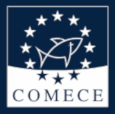In its contribution to the ‘Consultation on the White Paper on Artificial Intelligence – A European Approach’, COMECE calls the EU institutions to adopt a human-centric approach to Artificial Intelligence (AI) in order to promote the common good and serve the lives of all human beings both in their personal and community dimensions.
The COMECE contribution, published on 14 June 2020, welcomes the White Paper’s general intention to establish a solid European approach to Artificial Intelligence (AI) deeply grounded on human dignity and protection of privacy. It highlights that “data” and “algorithms” are the main drivers of Artificial Intelligence, while humans determine and overview the goals which an AI system should attain.
As already highlighted in the April 2017 COMECE contribution to the EP consultation on robotics, COMECE expresses perplexity on the possible creation of a new dedicated EU Agency as “the current key structures of the EU ensure sufficient support for addressing AI and robotics challenges”.
Should the EU opt for the establishment of some sort of EU coordination body devoted to AI, COMECE agrees with the statement made in the White Paper that the “…governance structure should guarantee maximum stakeholders participation”, including Churches, which have a specific status as partners of the EU institutions under Article 17 TFEU and should be explicitly mentioned in this context.
In its contribution, COMECE underlines the necessity of establishing a sustained social ethics discourse accompanying the political discussion on regulating AI. The EU should build tools and mechanisms for such a broad interdisciplinary discourse into the existing EU structures and programmes – as effective and concrete as possible, e.g. through the new research programme Horizon Europe or the revised Coordinated Plan on AI.
The COMECE document also includes detailed proposals in relation to areas such as fundamental rights (liability, safety, algorithms, children, protection of personal data), AI and sustainabiltiy, the fight against money-laundering and AI and cybersecurity.
In February 2019 COMECE published the reflection paper “Robotisation of Life: Ethics in view of new challenges”. In February 2020 COMECE participated in the international workshop “The ‘good’ algorithm? Artificial Intelligence, Ethics, Law, Health”, held at the Vatican on the occasion of the 26th General Assembly of the Pontifical Academy for Life. On that occasion, H.E. Mgr. Vincenzo Paglia, President of the Pontifical Academy for Life, signed the document “Rome Call for an AI Ethics”, supporting an ethical approach to Artificial Intelligence and the promotion of a sense of responsibility among organisations, governments and institutions in order to assure that digital innovation and technological progress serve human genius and creativity.



